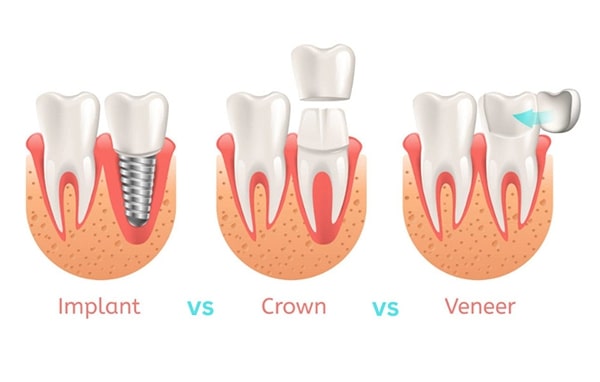
What to Know Before You Get Dental Veneers?
What are the different types of veneers?
Veneers have revolutionized the world of cosmetic dentistry, offering a versatile solution for a range of dental concerns. With different types to choose from, each with its own unique benefits, it’s essential to understand your options before enhancing your smile. Whether you’re drawn to the classic durability and natural aesthetics of porcelain veneers or the modern, minimally invasive no-prep veneers, there’s a perfect match for everyone. Let’s take a closer look at the defining features of porcelain veneers, composite resin veneers, and the increasingly popular no-prep veneers, empowering you to confidently achieve your desired smile.
Porcelain veneers
Experience the pinnacle of cosmetic dentistry with porcelain veneers, renowned for their superior strength and stunning natural appearance. Each veneer, meticulously crafted from premium porcelain, seamlessly blends with your existing teeth to create a flawless and dazzling smile. Not only do these veneers enhance your smile’s aesthetics, but they also offer lasting resistance against stains and mimic the light-reflecting qualities of your own teeth. Though the procedure may involve multiple trips, the end result is a radiant and enduring smile that will leave a lasting impression.
Composite resin veneers
If you’re on the lookout for an affordable and effective solution to transform your smile, composite resin veneers are definitely worth considering. Made from a natural-looking resin material, these veneers provide a fast and straightforward approach to improving cosmetic flaws. The best part? They can be applied in just one appointment, making them a great choice for those seeking a quick and hassle-free smile upgrade. While they may not offer the same durability as porcelain veneers, the cost-effectiveness and convenience of composite resin veneers make them incredibly popular among individuals looking for a budget-friendly cosmetic improvement.
No-prep veneers
With the ever-evolving field of cosmetic dentistry, no-prep veneers have emerged as a sought-after technique. Their minimalistic approach has gained widespread appeal, offering a less invasive alternative to traditional veneers. As the name implies, these veneers require minimal or no removal of enamel, thus preserving the teeth’s natural composition. This not only makes the process quicker but also less discomforting. No-prep veneers serve as a subtle yet effective means of enhancing one’s smile, making them a perfect choice for individuals seeking a refined and natural look without extensive dental procedures. While not suitable for everyone, their distinctive advantages have certainly earned them a significant place in the realm of cosmetic dentistry.
Which type of veneer is best?
Choosing the perfect type of veneer is a decision that requires careful deliberation, as multiple essential factors come into play. The price tag of the treatment holds significant weight, as it impacts the accessibility of the procedure. While porcelain veneers may come with a higher cost, their exceptional strength and lifelike appearance make it a worthwhile investment. For those on a budget, composite resin veneers offer an excellent alternative that does not compromise on aesthetics. Additionally, the length of the installation process is a crucial consideration, with no-prep veneers standing out for their convenience in comparison to the more time-consuming procedures associated with porcelain veneers. Of utmost importance is the appearance of the veneers, with the choice between the natural and translucent look of porcelain and the more cost-effective option of composite resin.
The success of using composite resin for veneers ultimately comes down to individual taste. It’s important to take into account the durability of the materials, as porcelain tends to have a longer lifespan compared to composite resin. Additionally, seeking advice from your dentist is crucial. They can analyze your oral health, lifestyle, and desired appearance to help you choose the veneer option that best suits your specific needs and desires.
What are the benefits of dental veneers?
Dental veneers are a highly sought-after option for achieving a dazzling and cohesive smile, thanks to their multitude of advantages. A key benefit is their effectiveness in dealing with cracked or fractured teeth. By acting as a protective covering, veneers not only restore the strength of damaged teeth, but also blend in seamlessly for a natural look. Furthermore, those struggling with severe discoloration or uneven coloring that traditional whitening techniques can’t fix can take solace in veneers. With their thin layers of porcelain or composite resin, even the toughest stains can be concealed, producing a consistently vibrant and uniform smile.
Not only do veneers play a key role in eliminating spaces between teeth, they also work wonders in achieving a beautifully aligned and visually appealing smile. For individuals with smaller than average teeth, veneers offer an impressive solution by enhancing size and proportion. Moreover, those with sharp or irregularly shaped teeth can reap the benefits of veneers’ versatility, as they can be tailored to complement the overall shape of the smile, resulting in a seamless and alluring look. In essence, dental veneers offer a personalized and all-encompassing solution to correct a variety of dental imperfections, ultimately helping individuals achieve a radiant and self-assured smile.
How to prepare for your appointment?
Get ready for your upcoming veneer appointment with a well-thought-out plan to make the process efficient and fruitful. Begin by arranging a preliminary consultation with your dentist, giving them the chance to carefully examine the state of your teeth. In this first meeting, your dentist will evaluate your eligibility for veneers, considering important factors such as the overall condition of your teeth, your oral health, and your desired cosmetic results. This is an ideal opportunity to openly communicate your doubts and inquiries about the veneer process.
Once armed with this valuable knowledge, your dentist will expertly guide you through the next steps, such as scheduling your appointment for the application of veneers. It is crucial to follow any instructions provided by your dentist before your appointment, which may involve tips for oral hygiene or dietary limitations. Taking a proactive approach to this preparation will ensure that you are primed both mentally and physically for the transformative journey towards your desired smile during your next visit.
How are veneers put on teeth?
The art of applying veneers onto teeth involves a careful and thorough process that ultimately results in a seamless and authentic look. After the initial consultation, the dentist begins by thoroughly cleansing your teeth to eliminate any potential obstructions for the bonding procedure. Then, a bespoke veneer is crafted to perfectly match the contour, shade, and proportion of your existing teeth, elevating your smile to its utmost potential.
After carefully crafting a custom veneer, the dentist meticulously bonds it to your tooth with a specialized adhesive, ensuring a seamless and secure fit. Any necessary adjustments are made to ensure maximum comfort and aesthetic appeal. To solidify the bond, a curing light is often used, resulting in a durable and long-lasting transformation of your smile. The end result is a natural-looking and comfortable smile that seamlessly integrates with your existing teeth.
What is the difference between veneers, crowns, and implants?
To navigate the world of dental enhancements, it is essential to grasp the distinctions between veneers, crowns, and implants. Veneers, typically crafted from porcelain or composite resin, are delicate covers specifically shaped to fit the front of teeth, enhancing their appearance. They are a fantastic solution for correcting cosmetic concerns such as stains or mild misalignment. Meanwhile, crowns provide both cosmetic and functional restoration by completely covering the tooth. This requires reshaping the damaged tooth, making it an effective choice for more extensive issues like decay or damage.
Dental implants go beyond just covering up imperfections like veneers and crowns. They provide a comprehensive solution for replacing missing teeth by surgically placing an artificial tooth root into the jawbone, topped with a replacement tooth. This not only restores the appearance of the tooth but also ensures its proper function. While veneers are mainly used for cosmetic purposes and crowns offer a combination of aesthetic and structural restoration, implants cater to the unique needs of tooth replacement.

How to take care of your veneers after they’re placed?
Maintaining a beautiful and long-lasting smile goes hand in hand with proper aftercare for your veneers. Your eating habits play a crucial role in the recovery process, especially right after the placement of your veneers. Begin by opting for softer foods to alleviate any discomfort and allow your teeth to adjust smoothly. Consistent check-ups with your dentist are crucial for monitoring the condition of your veneers and addressing any concerns promptly. With their strong material, traditional porcelain veneers can last up to 5 to 7 years, and even longer with diligent care. To prevent unnecessary stress on your veneers, refrain from habits like teeth clenching or grinding, especially during sports activities.
If you tend to clench your teeth, your dentist may suggest getting a custom night guard to protect your veneers while you sleep. In addition, maintaining good oral hygiene habits such as brushing and flossing regularly is important in keeping both your natural teeth and veneers healthy. By taking a careful and proactive approach to caring for your veneers, you can enjoy a beautiful smile for many years ahead.









